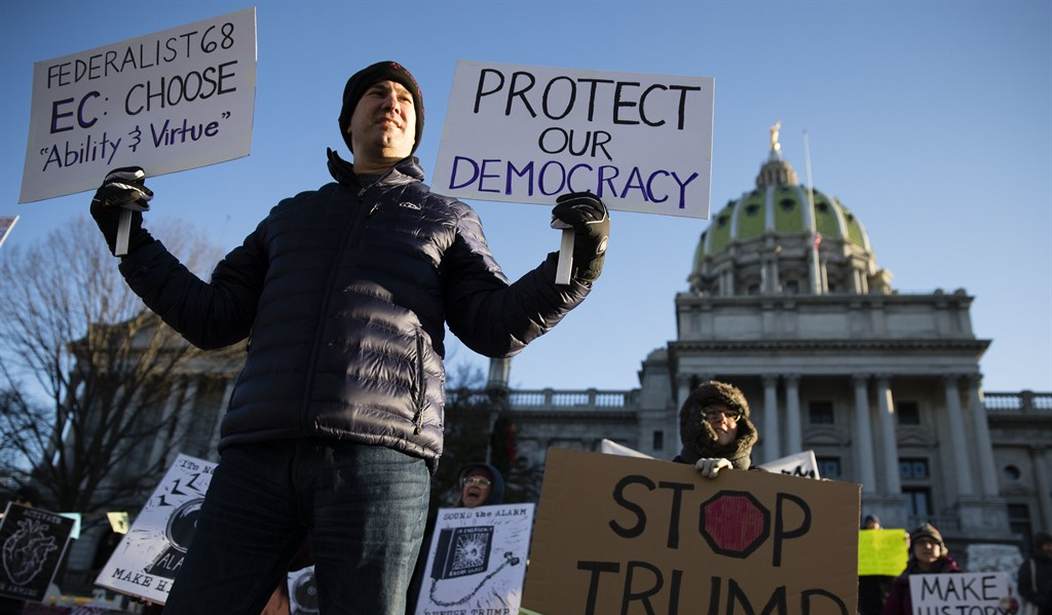The Electoral College is a racist system that helped slave states, and that’s why it should be abolished. That’s one of the many talking points the Left has hurled against our electoral process. In all, it’s just the typical antics of a sore loser. The Electoral College has to go because Hillary Clinton lost and California gave her more popular votes (no kidding since it’s a left wing cesspool). Even The New York Times says the Electoral College has to go because it’s racist (with the three-fifths compromise bit), and because Clinton got more popular votes (though she didn’t win the majority). Once again, the Left shows they have no sense of history, despite being obsessed with being on the right side of it.
Well, Allen Guelzo and James Hulme, a Civil War professor at Gettysburg College and attorney, respectively, wrote in The Washington Post that the Electoral College was instrumental in destroying slavery, it reinforces the concept of federalism, and it’s an overall stabilizing force in our system of government:
…the electoral college had nothing to do with slavery. Some historians have branded the Electoral College this way because each state’s electoral votes are based on that “whole Number of Senators and Representatives” from each State, and in 1787 the number of those representatives was calculated on the basis of the infamous 3/5ths clause. But the Electoral College merely reflected the numbers, not any bias about slavery (and in any case, the 3/5ths clause was not quite as proslavery a compromise as it seems, since Southern slaveholders wanted their slaves counted as 5/5ths for determining representation in Congress, and had to settle for a whittled-down fraction). As much as the abolitionists before the Civil War liked to talk about the “proslavery Constitution,” this was more of a rhetorical posture than a serious historical argument. And the simple fact remains, from the record of the Constitutional Convention’s proceedings (James Madison’s famous Notes), that the discussions of the Electoral College and the method of electing a president never occur in the context of any of the convention’s two climactic debates over slavery.If anything, it was the Electoral College that made it possible to end slavery, since Abraham Lincoln earned only 39 percent of the popular vote in the election of 1860, but won a crushing victory in the Electoral College. This, in large measure, was why Southern slaveholders stampeded to secession in 1860-61. They could do the numbers as well as anyone, and realized that the Electoral College would only produce more anti-slavery Northern presidents.
[…]
The Constitution also makes us a federal union, and the Electoral College is pre-eminently both the symbol and a practical implementation of that federalism.
The states of the union existed before the Constitution, and in a practical sense, existed long before the revolution. Nothing guaranteed that, in 1776, the states would all act together, and nothing that guaranteed that after the Revolution they might not go their separate and quarrelsome ways, much like the German states of the 18th century or the South American republics in the 19th century. The genius of the Constitutional Convention was its ability to entice the American states into a “more perfect union.” But it was still a union of states, and we probably wouldn’t have had a constitution or a country at all unless the route we took was federalism.
The Electoral College was an integral part of that federal plan. It made a place for the states as well as the people in electing the president by giving them a say at different points in a federal process and preventing big-city populations from dominating the election of a president.
[…]
Without the Electoral College, there would be no effective brake on the number of “viable” presidential candidates. Abolish it, and it would not be difficult to imagine a scenario where, in a field of a dozen micro-candidates, the “winner” only needs 10 percent of the vote, and represents less than 5 percent of the electorate. And presidents elected with smaller and smaller pluralities will only aggravate the sense that an elected president is governing without a real electoral mandate.
The Electoral College has been a major, even if poorly comprehended, mechanism for stability in a democracy, something which democracies are sometimes too flighty to appreciate.
Recommended
Guelzo and Hulme also touched upon another fact that’s often lost in political discussions, which is that our government was never meant to be efficient; it was meant to be safe. So, besides the Electoral College, and George Will has touched upon this ad nauseum, we also have three branches of government, two branches of the legislature, veto, veto override, supermajorities, and judicial review. All of these things were meant to slow down government.
Alas, it appears another liberal talking point has been shot down. I don’t know about you, but the 13th Amendment was a good thing.

























Join the conversation as a VIP Member